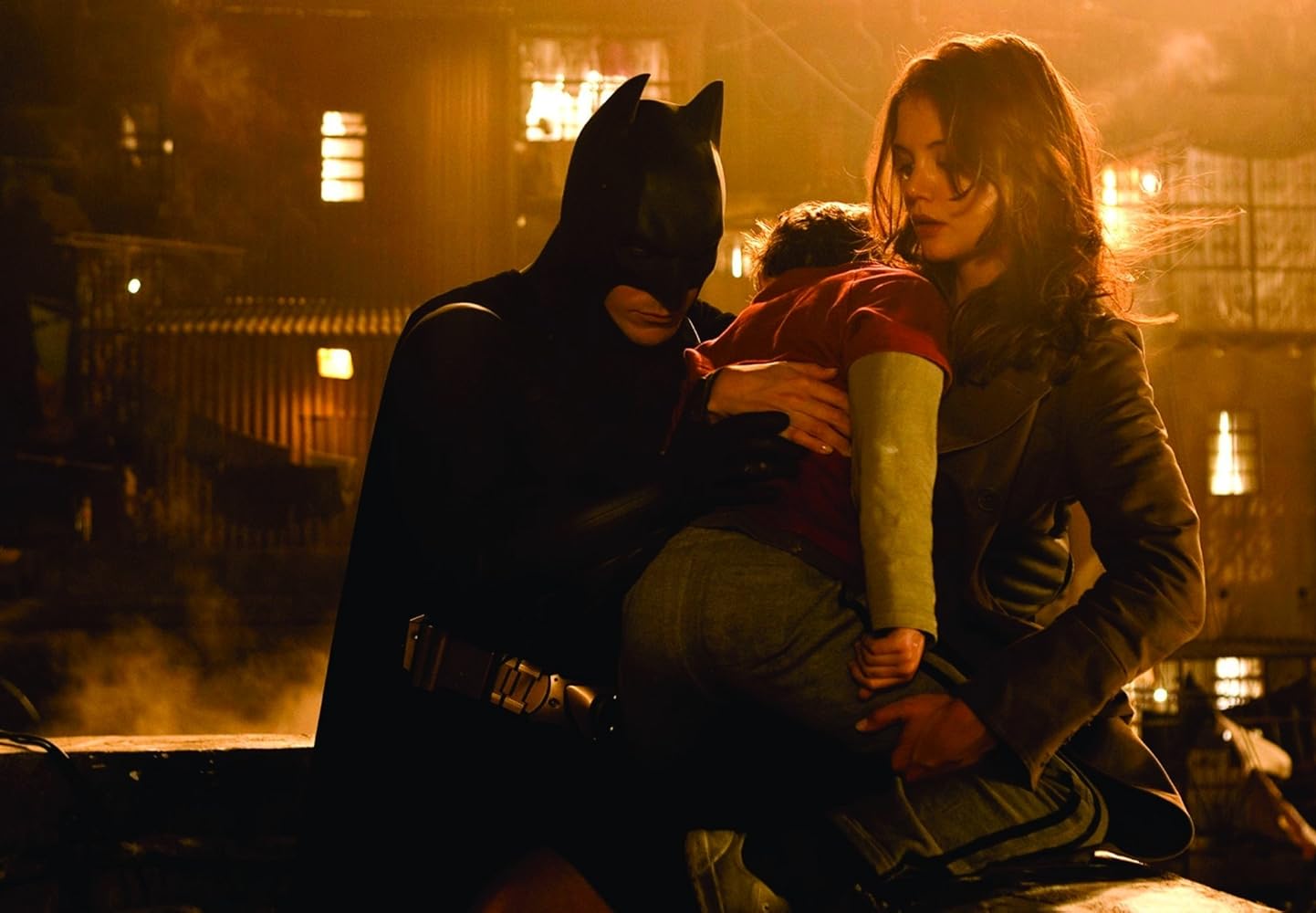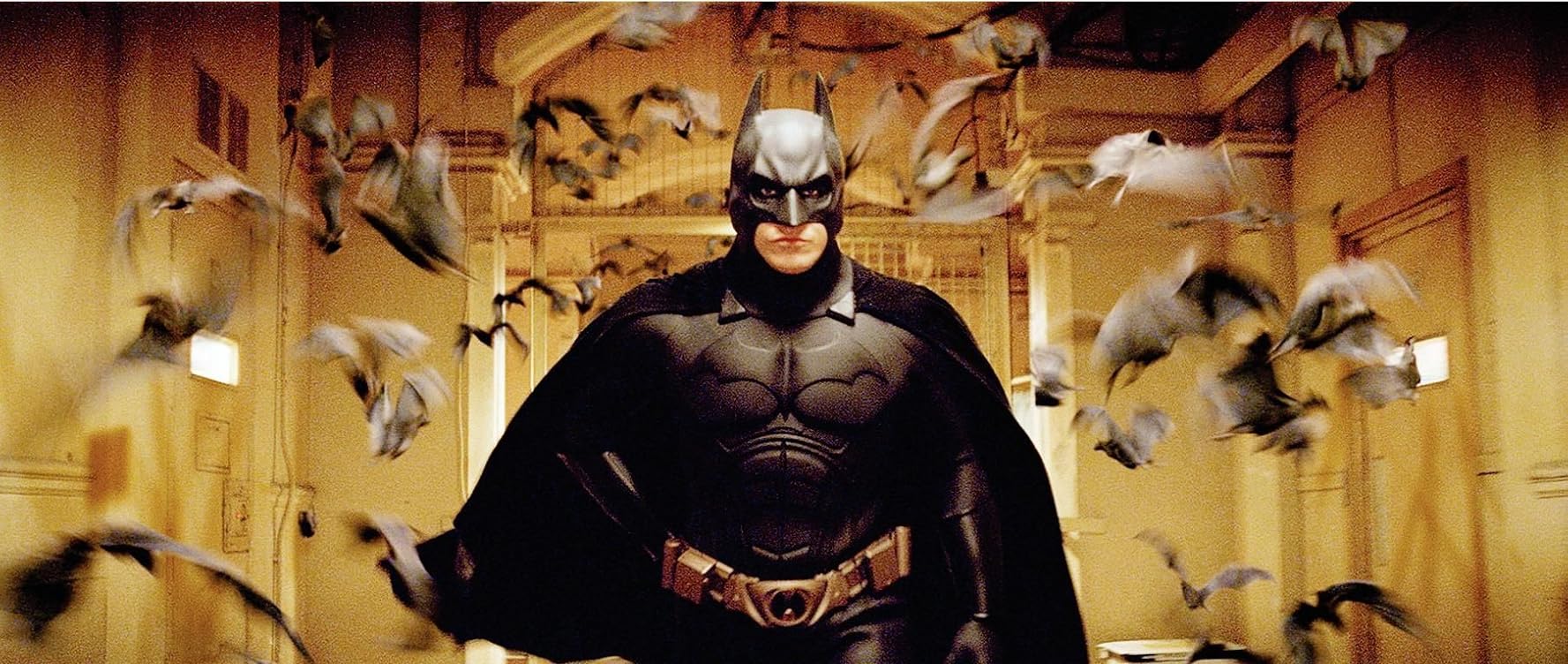In 2005, Gotham was in turmoil. After the critical and commercial disappointment of 1997’s Batman and Robin, several projects to revitalise the Dark Knight onscreen (including a hastily made Catwoman film in 2004) had fallen away. With the success of Sony’s Spider-Man and Fox’s X-Men films, superhero films were becoming a lucrative property, but Warner Brothers was sitting on the two most iconic superheroes of all time, waiting to launch them into the 21st century. Relative Hollywood newcomer Christopher Nolan then pitched them an idea for a new Batman film, going from the Warner Brothers produced mid-budget thriller Insomnia to his most ambitious project yet. Assisted by screenwriter Davis S. Goyer for comic-book knowledge, and heavily influenced by Frank Miller’s iconic Batman: Year One, they created a definitive origin story with Batman Begins, an important but frequently overlooked stepping stone in the evolution of the film industry.

Begins is often undervalued, viewed as merely the set-up for The Dark Knight, which is still (rightfully) regarded as the greatest superhero film of all time. But Begins is what lay the foundation for Dark Knight to be great. Although the X-Men films had already approached comics in a ‘realistic’ manner, Batman lacks the supernatural, mutant powers to separate him from reality, and Begins also abandons the gritty melodrama of films like Daredevil. Indeed, Nolan purposefully employed minimal special effects in Begins to add to its authenticity, mostly utilising practical effects and stunt-work (with the exception of Scarecrow’s hallucinogenic toxins – an element that somewhat stands out in this franchise), cultivating the grounded circumstances that would lead someone ordinary performing extraordinary acts.
Nolan is sometimes considered a cold and cerebral filmmaker. And while sometimes true, he is a robotic filmmaker fascinated by people’s actions. Memento follows someone attempting to reverse-engineer their past, while Inception is an action-thriller about literally planting an idea in somebody’s head. It is this meticulous eye which leads to a tight screenplay re-examining Batman’s origin.
Of course, everybody knows the climatic instigation of young Bruce Wayne witnessing his parents’ murder, but Begins peers into the valleys between these peaks, showing how he transitioned from a scared child into the fearsome Caped Crusader. Opening with adult Bruce (Christian Bale) left directionless in an Asian prison, it tracks his recruitment to the League of Shadows via Ducard/Ra’s al Ghul (Liam Neeson) (whose comic-book immortality from Lazarus Pits is reworked as stand-ins (like Ken Wantanabe) and theatrics), his training in their methods of combat and stealth, and his refusal to use lethal force. Once Bruce returns to Gotham, the film delights within the assembly of the iconic persona, using Lucius Fox (Morgan Freeman) in Wayne Enterprises’ R&D division to deliver Batman’s highly-specific equipment, having Bruce and Alfred (Michael Caine) purchasing parts of the Batsuit through shell-corporations in mass-quantities (“at least we’ll have spares”, Bruce notes), and excavating an underground cavern as the basis for operations. Even the Bat-Signal is given an explanatory nod when Batman chains up crime boss Falcone (Tom Wilkinson) to a flood-light.

But it’s the iconography of the ‘Bat’ itself which is the focus of Begins. Tim Burton’s Batman left motivations vague, content to have Batman be another inexplicable piece of Gothic furnishing, but Nolan is determined to have a clear sense of what leads to Batman’s creation. The film radically inverts expectations by making bats Bruce’s childhood fear, one which scared him to leave the theatre with his parents, inadvertently causing their deaths. Batman’s origin is now infused with a degree of guilt previously absent, which is only compounded when Bruce is later denied revenge against the mugger Joe Chill, who is assassinated by Falcone instead. Prevented from the short-term catharsis of killing his parents’ murderer, Bruce’s anger instead ferments into a larger crusade against all injustice.
Ironically, Falcone helps Bruce on his journey to self-understanding, inadvertently channelling his undirected anger into something greater than himself. Falcone reminds Bruce that his wealth and privilege protect him from truly understanding Gotham’s criminal underworld. Rather than tacitly ignoring Batman’s billionaire status, Bruce takes in Falcone’s comments that he’d “have to go a thousand miles to meet someone who didn’t know your name” and travels far away from Gotham, going places where there are no expectations of Bruce Wayne, so that he can understand and construct who he truly is.
A fascinating element of Batman is that “Bruce Wayne” is the disguise. Here, Bruce uses his wealthy playboy persona not only to justify his unusual lifestyle (telling Fox he is taking the prototype Batsuit for “spelunking”), but to detract suspicion; he saves his birthday guests from Ra’s’ men through a fake drunken rant. Bruce’s public persona is secondary to his masked one, defined by his actions instead of his perceptions. In an eloquently written moment of analysis, Bruce explains to Alfred the need for such costumed theatrics; “People need dramatic examples to shock them out of apathy… As a man, I’m flesh and blood, I can be ignored, I can be destroyed. But as a symbol? As a symbol I can be incorruptible. I can be everlasting”.

He explains this symbol must be “elemental” and “terrifying”, and so Bruce chooses his own fear of Bats as his way of scaring corruption out of Gotham. And although his appearance is withheld until an hour into Begins, this Batman is scary. He is not a colourful crimefighter but a creeping monster, snatching criminals from the shadows like a horror movie monster. Compared to The Dark Knight, Bale’s Batman voice is actually restrained, but he still growls in the rain and is constantly crouching on rooftops, creating an animalistic legend that outlasts the man beneath the scowl.
Fear is the main theme of Batman Begins, harnessed by Batman and abused by Scarecrow (Cillian Murphy), a relatively small part which Murphy plays with delicious creepiness, his eyes lighting up when witnessing Batman’s intimidation first-hand (Scarecrow would make cameos in all Nolan’s Batman films). Begins analyses the use of fear, with Falcone and Ra’s using it to terrorise the city, while Batman conquers his own fears to try and redeem it. Batman Begins takes a mature approach to one of Batman’s most prominent features, his shadowy intimidation, bundled within a tight and compelling origin story.
Yet despite this grounded approach, Batman Begins is not relentlessly dour and dark. Nolan commented that he wished to create a film his 12-year-old self could watch, so despite the grounded tone there is no extreme violence or strictly adult content, allowing for a film both adults and young teenagers could enjoy. While its jokes are not as overt as the MCU’s comedy, Begins often features sly humour that keeps it an entertaining watch, with Alfred often a humanising source for Bruce and welcome comedic relief. When suggesting how Bruce should maintain his double-life, he adds “if you start pretending to have fun, you might even have a little by accident”.

Michael Caine’s dignified loyalty, and the rest of the supporting cast, also keep Batman Begins grounded in prestige. For 2005, the impressive casting helps fill out the roles in Gotham to grant it more three-dimensional authenticity. Nolan specifically cites 1979’s Superman: The Movie as using its own supporting cast (including Gene Hackman and Marlon Brando) to add credibility to iconic roles (even if both those performances are questionable). Gary Oldman particularly adds a weary determinism to Sergeant Jim Gordon. Tom Wilkinson is campy to the perfect degree as Falcone; in reviews, Katie Holmes is often singled out as a weakness, and although her character feels fairly tacked-on, she performs fine as a moral-counterpoint to Bruce that works within the system (even if she would be replaced by Maggie Gyllenhaal in the sequel).
Batman Begins is not a perfect film. It is clearly more interested in the construction of Batman than seeing Batman exist, the film becoming hollower after his initial appearance. Likewise, the final act turns the expository dialogue leaden and is fairly unsatisfying, with Batman’s decision “not to save” Ra’s feeling unnecessary and contradictory, and Scarecrow being disposed of anticlimactically. The high-speed pursuit aboard Gotham’s monorail dips into CGI the rest of the film had avoided, and the majority of fight-scenes are largely incomprehensible.

Most all of these flaws would be fixed in The Dark Knight, but Begins remains a solid foundation for Batman’s character, holding up well as a standalone entry 15 years later. Its cinematic influence is complicated. Although it and The Dark Knight cemented a grounded approach to superhero films, films like Iron Man which were influenced by its approach (including the way Tony Stark carefully creates his superhero persona) would ultimately diverge into more light-hearted treatments. As a Superhero film, Begins certainly feels of another era. Yet outside of superheroes Batman Begins also spread its legacy. For one thing, Nolan’s career was secured by the success of this studio franchise, enabling him to take risks on high-budget conceptual films like The Prestige or Inception, and ultimately become one of Hollywood’s biggest high-budget auteur filmmakers. Begins was also the cornerstone for the reboots of the 2000s, its deconstructionist and grounded approach undoubtedly an influence on many ‘origin stories’ of sorts, including Casino Royale.
Instead of ending with a romantic conciliation (Rachel tells Bruce she must wait until Batman is no longer necessary), Begins concludes with Gordon atop a rooftop with Batman, discussing the potential for “escalation”, handing him a Joker playing-card. Regardless of how the cinematic landscape changes, what route Superhero movies take, or how Matt Reeves handles Batman for his upcoming adaptation, Batman Begins is an essential foundation step before the character’s rise.
